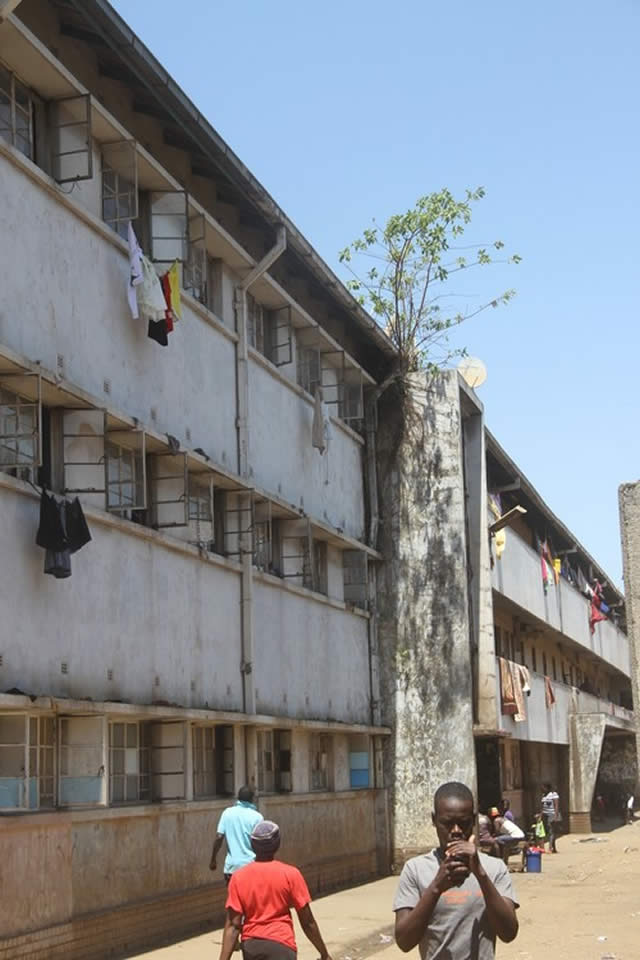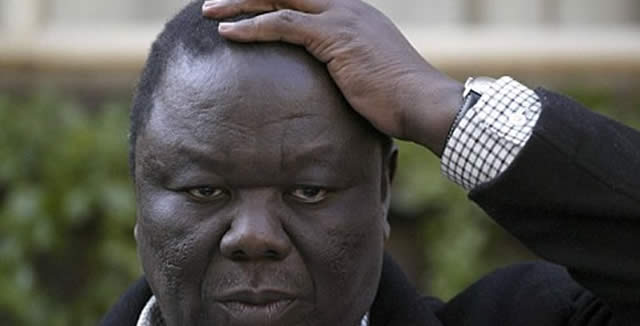Whither Mbare flats?


NEGLECT . . . A tree grows on the roof of Matapi Hostel in Mbare directly opposite a Harare City Council office
Stanely Mushava Features Correspondent
Mbare merits distinction as the host of Zimbabwe’s largest vegetable market and bus terminus and home to music and sporting talent — emerging and past. It also has the flagship radio station and boasts the ceremonial home of football, Rufaro Stadium. These features, along with a century of cultural strivings, give Mbare a cosmopolitan resume, making it one of the most famous suburbs in the country, and for some, a legend synonymous with Harare itself.
After all, the capital city derived its name from the high-density suburb, and the contemporary interpretation of “Harare” as the hive of nocturnal “hustlers”. However, Mbare is a case of fronting a radiant face while the body is sick, if deplorable living conditions in the suburb are anything to go by.
A recent visit by The Herald to Mbare’s Matapi, Magaba, Matererini and Shawasha Flats, established poor service delivery by council, negligence by residents and health hazards which tens of thousands brave every day. As if to nail the final indictment on municipal negligence, a fully grown tree waves on the roof of Block 4, Matapi, tearing through the structure and exposing families to every mood of weather, this just a stone’s throw from Harare City Council’s Mbare office.
“We wake up in a dam whenever rain falls without warning,” a Block 4 resident opens up to The Herald. “We have no means to guarantee our household appliances from damage as the council no longer lifts a finger to renovate the flats.” The roots of the tree have cracked a sizeable segment of the roof.
Damage to appliances is not even the last catastrophe as children miss school, down with recurrent cold bouts, during the rainy season. Several apartments at the bedraggled hostel are now disused after they were burnt following an electric fault. Affected families were evacuated to Shawasha Flats where entertainment centres, colloquially dubbed sea-holes, were partitioned using cardboards to house them.
There is no running water at Shawasha Flats and raw sewage spews from dysfunctional toilets. In several instances, steady streaks of slime trickle down make-do glass, paper and tape windows to one huge receptacle downstairs. A brutal odour greets visitors on the ground floor of Block 7, Matapi, wrenching the stomach and thickening as one courses around the staircase.
“This is how we are living, my brother. What can we do without water for so many families?” Amando Maweni (35) says he gestures to the dysfunctional ablution facilities. Flies buzz all over the place, evidently having a busy working day from one puddle of indoor sewage to another. Stagnant water which seems to have collected for days exports its own distinctive stench which invites an imaginary comparison to a concoction of stale brew and vomit.
Across the other end, empty bottles, stale sadza and other objects litter another stagnant pool of water, by now degenerated from the liquid of life to a hostile substance bordering on the opposite. Two hundred and twenty-four families are home in this flat. Maweni was born here. He has been a Matapi resident for as far as he can look back. And things have only been changing for the worse.
“Council has long stopped giving us water. We queue at their office where there is a constant supply, although it is not nearly as much of a burning necessity there as it is here,” Maweni says. “We queue for hours for our turns but obviously not everyone can afford to wait that long,” he says. “In the end, no one takes it upon themselves to relieve the toilets after use. The squat hole is always full and running over. So people just use the toilet like that and it is cleaned once in the morning everyday,” Maweni says.
In the square downstairs, women do their laundry while they chat animatedly, apparently oblivious to their degenerate settings. Just by the entrance, a few vendors sell fruits, maputi, cigarettes, sweets and other dollar-for-fistful items. Disused shelves are stacked into each other on the ground floor, adjacent to sackfuls of refuse and rolls of fence.
The paint has been washing into irregular peels for years, and the walls conspicuously pleading for a few licks of paint.
“Things have become even more difficult with the increased frequency of Zesa blackouts. Yesternight electricity only came around 11pm and was gone by the time we woke up. This is such a drain on the little we have,” Maweni says.
Jephtah Chirisa (62) has lived in Matapi for 35 years.
“We cannot speak of a time when life here was exactly a paradise but there was a time when the flats were more habitable,” Chirisa says.
“Back then, council would service the flats after every five years. This year is the 20th since the flats were last serviced. Since 1995, collecting rentals and rates is the only way council is involved,” Chirisa says.
The residents pay a monthly rent of $45, marked down from a slightly higher figure, but they still complain that amount is a rip-off given poor service delivery by the city council. “Nothing has been repaired for that long. At least we could put a reasonable part of that $45 to good use; we could, for example, contribute towards taps and other indispensables,” Chirisa says.
“When we came here, these were supposed to be temporary structures and we had been promised new homes in Sanganai. Many years have since passed and we have not received anything save for further promises,” he says. Chirisa stated that tuberculosis and diarrhoea were rife in the flats because of the degenerate living conditions. “Last year, five members of one family succumbed to TB,” he says.
A resident of Shawasha says council had withdrawn regular services when the flats were let to families, moving on from the original arrangement whereby they were supposed to house bachelors employed in Harare. “Council used to deploy security in the flats. Once the guards were discharged, vandals broke loose stealing basic necessities like taps for sale,” says the resident who would not be named.
“The taps are now too old and if ever water comes it is a rusty trickle which is unfit for consumption. We do not see the point of complaining to newspapers. The Housing Ministry must come here and tell us if this is the way they want us to live,” he says. Harare City Council spokesperson Michael Chideme says lack of funds is stalling renovations.
“The council plans to upgrade the rooms into family units, so that every family will have its own ablution facilities. However, at the moment council has no money to undertake the project,” Chideme says. Mbare is a site of intrigues but one assessment is inevitable. The suburb sits on a health time bomb of pestilent proportions.
Feedback: [email protected]







Comments